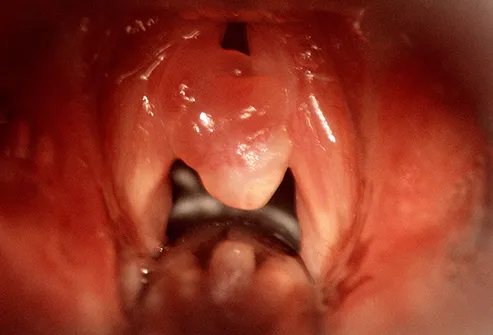
|
SLIDESHOW
|
What You Need to Know About Polyps

1/14
What’s a Polyp?
It’s a small clump of
cells that grows inside your body. There are 2 common types: The first hangs
from a stalk. Doctors will call this pedunculated. The second is flat and grows
directly out of the tissue around it. You’ll hear it called sessile. Some polyps
are benign and can’t turn into cancer. Others can. The odds depend on their
location, cause, and how long they’ve been there.

1/14
Colon Polyps
They’re more common than
you might think -- almost half of us will get them. There are 2 main types:
·
Hyperplastic
polyps are small, grow near the end of the
colon, and don’t turn into cancer.
·
Adenomatous
polyps affect more people. If they’re
large, they’re more likely to become cancer, but it usually takes years. Most
remain noncancerous.

1/14
Colon Polyps: Diagnosis and Treatment
During a colonoscopy,
your doctor uses a tool to put a small camera into your anus so she can
look at your colon. If she sees polyps, she’ll remove them. She’ll also send a
piece to a lab to look at with a microscope. This process, called a biopsy, is
how she’ll know if it’s cancerous. You’re less likely to get cancer if your
doctor finds and removes polyps early. She can help you decide when to do it,
but most people should get a colonoscopy to look for polyps at 50.

1/14
Aural Polyps
These grape-like
clusters grow in your middle ear or ear canal. They’re often red and bleed
easily when touched. They can sometimes be cancerous. It may be hard at first
for your doctor to tell if they grew on their own or if were caused by an
infection or some other condition.

1/14
Aural Polyps: Diagnosis and Treatment
If your doctor thinks
the polyps result from an infection, she may prescribe antibiotics to get rid
of them. If that doesn’t work, she might cut out a small piece to look at under
a microscope to see if they’re cancerous. If they don’t go away, you’ll likely
need surgery to get rid of them.

1/14
Nasal Polyps
Most are noncancerous.
They pop up inside your nasal passages or sinuses when the lining is inflamed
and swollen for a long time. They can weaken your sense of taste or smell, and
cause a runny nose, headache, and snoring. Often they grow big enough to cause
infections or make it hard to breathe.

1/14
Nasal Polyps: Diagnosis and Treatment
Your doctor may suspect
you have polyps because of your symptoms. She can look up your nose with
a tool called a nasal endoscope to see for sure. Drugs that you swallow or
spray into your nose may help get rid of them. Antibiotics may help if you have
an infection. If they don’t work, your doctor can use an endoscope to remove
the polyps. But if you have severe polyps, you might need more involved
surgery.

1/14
Uterine Polyps
Also known as
endometrial polyps, these grow in the lining of your uterus. Some are attached
with a thin stalk (they’re called pedunculated). Others grow from a broad base
(they’re called sessile). They are roundish in shape and can be as small as a
sesame seed or as large as a golf ball. They’re usually noncancerous, but they
can change your monthly period or make it hard to get pregnant.

1/14
Uterine Polyps: Diagnosis and Treatment
Along with an exam,
monthly cycle details -- how long, how frequent, how much blood, spotting
between periods -- can help your doctor decide if you have polyps. She may look
at your uterus or remove a piece of it to test. You might not need treatment if
you have no symptoms. But if polyps cause heavy bleeding, pregnancy problems,
or come after menopause, she’ll want them gone. Drugs can ease symptoms, but
only surgery can get rid of polyps.

1/14
Vocal Cord Polyp
It’s a noncancerous
growth or lesion on your vocal cord cover. It usually grows on just one side of
the vocal cord. Your voice may be hoarse, lower than normal, or break in the
middle of a sentence. It might take more effort or force to speak or sing.

1/14
Vocal Cord Polyp: Diagnosis and Treatment
Your doctor will want to
know the full history of your voice problems. She may put a tube through your
mouth to look at your vocal cords. She’ll check for acid reflux, allergies, and
hormone problems. They can all make your voice problems worse. Voice rest and
special vocal exercises may be all you need to get better. This depends in part
on how you use your voice. A professional singer may need surgery.

1/14
Stomach Polyps
Also called gastric
polyps, they form on the lining of your stomach. Most don't become cancerous,
but some types mean you’re more likely to get the disease in the future. They
often don't cause any symptoms. Your doctor usually finds them when she examines
you for some other reason.

1/14
Stomach Polyps: Diagnosis and Treatment
If your doctor suspects
polyps, she’ll look into your stomach with a tool called an endoscope. If she
sees a type called adenoma, which can become cancer, she may remove it or take
a piece to look at. She could test it for H. pylori bacteria,
which are linked to stomach polyps, and prescribe antibiotics if you have them.
For small polyps that aren’t adenomas, she might just watch them to see what
happens. She’ll probably remove large polyps.
This tool does not provide medical advice
মন্তব্যসমূহ
একটি মন্তব্য পোস্ট করুন